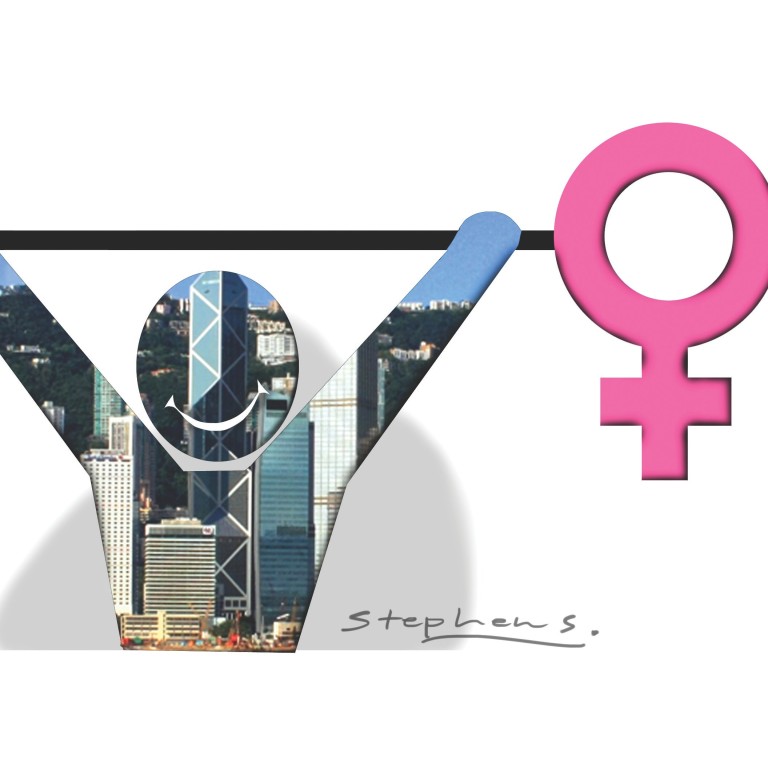
Gender equality is good not just for the economy, but also society's overall health
Paul Yip and Stephen Tsang say Hong Kong should learn from findings linking health with gender equality
One of the most exhaustive studies on the relationship between women and health was published in recently. Analysing data from 32 countries, accounting for 52 per cent of the world's population, it also highlights women's contribution to the health care industry as both consumers and providers. It calculated their financial contribution to global health care to be around US$3 trillion, of which nearly half is unpaid and unrecognised.
The publication of this report is timely. Three years in the making, the study examines the complex links between the biological, economic and social factors that can improve the health of both women and society. brought together leading thinkers and activists from around the world for the study, in a group headed by Dr Ana Langer of the Harvard T. H. Chan School of Public Health. The timing is perfect: the international community is now finalising its post-2015 development agenda dubbed the Sustainable Development Goals.
The report focuses on issues pertaining to low-to-middle-income economies, such as universal access to health care, maternal mortality and the availability of contraception. At first glance, this seems a world away from Hong Kong. On closer reading, however, the report is highly relevant for a city that mixes traditional Confucian values and modern Western culture with ease.
As the report puts it, when women are "valued, enabled, and empowered" in the social, environmental and economic domains, "gender equality and health can be achieved; and when women are healthy and have equity in all aspects of life, sustainable development will be possible".
This points the way towards a strategic vision for Hong Kong.
The study's authors saw women's health as encompassing more than the usual maternal disorders. Instead, they took a life-course approach. "Reproductive health interventions should not be isolated from the holistic needs of women's health. Comprehensive life-course perspective is necessary to effectively target causes of disorders that women face later in life," they said.
It is from there that we can see how Hong Kong is only just scratching the surface of what is truly needed. It is not only about having the best IVF centre, for instance, but about, as stated in the report, "recognition, valuation and compensation of women's roles … to achieve gender equality and maximise women's contributions to families, communities, and society".
The report's main recommendations are to value and compensate women, to ensure women are counted and be accountable to women. Especially relevant to Hong Kong are the following:
- Recognise women's paid and unpaid contributions as health care providers;
- Implement and enforce policies to support women in their diverse roles and enable them to integrate their social, biological and occupational contributions;
- Estimate the value of women's paid and unpaid contributions to health care and recompense their invisible subsidy to health systems and societies;
- Ensure that women are accounted for in the quantification of the health workforce;
- Mandate that research studies enrol women and publish findings disaggregated by sex;
- And, develop and implement an accountability framework and indicators for women and health.
It is of course already well established that a country's socio-economic development is strongly linked to the status of its women. The 19th-century writer Harriet Martineau, often hailed as the first woman sociologist, said: "If a test of civilisation be sought, none can be so sure as the condition of that half of society [women] over which the other half [men] has power."
A World Bank paper in 1999, titled "Gender Inequality, Income and Growth: Are Good Times Good for Women?", concluded that "the basic story that emerges is that gender equality and economic development are mutually reinforcing". Hence, it was natural that one of the eight UN Millennium Development Goals was to promote gender equality and empower women.
To put it simply, the report delineates the importance of women's equality and economic significance, not just in lower-to-middle-income countries, but also in higher-income economies like ours.
Hong Kong, with its forward-thinking population and policymakers, has already made inroads in this cause. This is evident in the lack of gender bias in childbirth and equal opportunities at all levels of education.
But there is still much to do. Paying carers for the sick and the elderly, as happens in Turkey, Costa Rica and Britain, will need some budget reprioritising and will therefore take time. Other recommendations, such as flexible working schedules, leadership development programmes targeting women, mentoring programmes and corporate women's networks, are all definitely within our reach and deserve serious consideration. Certainly, gender equality in pay and promotion opportunities has room for improvement.
Imagine a day when all the world's talent is attracted to Hong Kong not for its low taxes, efficient infrastructure and booming trade with mainland China, but for its women-focused policies. Of all the strategic advantages Hong Kong has over its fellow East Asian neighbours, this is something that has the potential to make Hong Kong truly a world city - a city of the future.
We shouldn't just tackle our most immediate problems, like rectifying the ratio of women's toilets to men's; we should forge policies with a vision and a time-table that are in line with the most progressive countries.
The whole of society will be empowered if women's human capital can be realised, used and appreciated.

